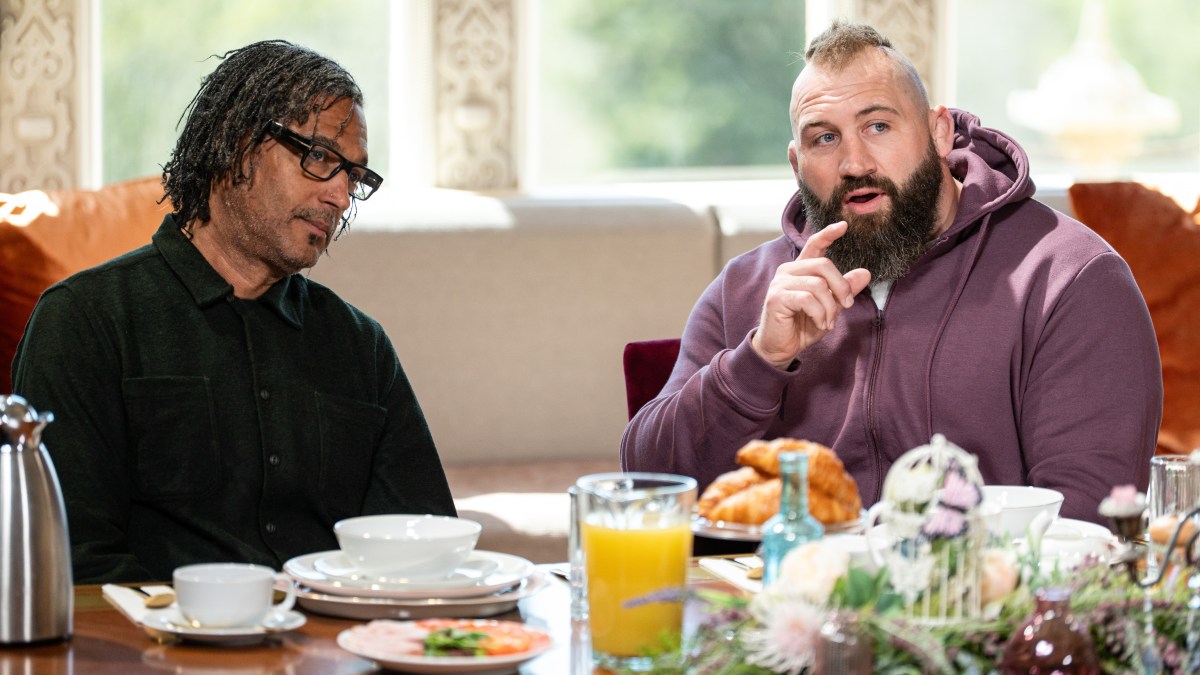Along with Cat Burns, Joe Marler has emerged as the breakout star of The Celebrity Traitors. Whether or not he triumphs in the series finale on Thursday, Big Joe, previously only familiar to those of us who follow rugby union, has become a household name. If he plays it right, he’ll soon graduate to full-blown national treasure. Having interviewed Marler twice, however, I wouldn’t be surprised if he sabotages his big chance. I can’t quite see him being willing or able to play the cuddly celeb role for long.
Don’t get me wrong. I love the guy. But he is, to put it mildly, a complex character. A prop forward, 6ft tall, 19st, hugely bearded, covered in tats, Marler might present as the archetypal intimidating rugger jock. He is anything but. For one thing, as we have seen, he has enviable clarity of mind. He’s a smart fella, sifting the evidence of his own apparently guileless baby-blue eyes and mangled cauliflower ears far more adroitly than those reputedly great intellects and fellow Traitors contestants Stephen Fry and David Olusoga. He’s warm, open, tactile, funny, charming. But he’s mercurial too, occasionally tetchy or morose, outspoken yet also shy, and cripplingly lacking in confidence.
When he was first called up for England in 2010, he told me, he was so “nervous and scared, I hardly spoke”. By the end of his international career last year, he had become a big dressing room influence. It has been a similar story in the Highlands, with Marler, 35, journeying from deferential to dominant. Overlooked at first, and no doubt underestimated, Marler locked on first to Jonathan Ross’s treachery and then, having correctly identified the other two baddies, is now organising their downfall.
• Am I a Faithful or a Traitor? I fancy myself as Jonathan Ross
It has been an impressive display of the desire, focus and teamwork required by and honed in elite sport. Pro sport also prizes ruthless candour about one’s own and one’s team-mates performances, a trait that Marler has occasionally demonstrated in recent weeks. His younger critics on social media don’t respond well to that.
Marler and I first met three years ago, at Twickenham Stoop, the home ground of his club side, Harlequins and next door to the national stadium where he won many of his 95 caps for England. One of the beneficiaries of The Times Christmas appeal that year was Calm, or the Campaign Against Living Miserably, the suicide prevention charity. Having spoken publicly of his mental health issues, with stints on antidepressants and in therapy, Marler had become a Calm ambassador. He told me that he’d had “dark thoughts, yeah, suicide; ‘would they be better off if I weren’t here any more?’” The “they” being his wife, Daisy, and four children, Jasper, Maggie, Felix and Pixie.
We sat in the stands, eating chocolates, while Marler recounted his problems with “a lack of self-worth”, the belief that he was “a bad person”, the feeling of “I don’t want to be here any more, like ‘what if I drove off that bridge? What would it be like not to be here?’” He recalled “crying in my coach’s arms”; how, earlier in his career, he had sometimes been unforgivably rude to fans seeking selfies; how he had stormed away from games, driven home from southwest London to his native Sussex (he grew up in Eastbourne) in full kit covered in mud, and terrified Daisy by smashing up the kitchen.
He had been no angel on the pitch either, incurring bans and fines for behaviour below and beyond the usual front-row sledging. He called the Wales prop Samson Lee, who has a Traveller background, “Gypsy Boy”. He slapped an opposing coach at Worcester. He grabbed the Wales captain Alun Wyn Jones’s unmentionables, in full view of the cameras. Shortly after we met in 2022, he told a Bristol opponent that his mum was a “f***ing whore”. (Daisy ripped into her errant husband after that episode, telling him his behaviour was unacceptable.) He also wound up the All Blacks by tweeting that their haka is “ridiculous and needs binning”.
He’s the sort of guy who draws attention to himself, for sure. But he’s also that kid at school who gets caught doing things that sneakier types get away with.
• Cat Burns: ‘Traitors is the most fun game’
Marler’s anger and unhappiness stemmed, predictably, from his childhood. He told me some details but didn’t want them published. Suffice to say, as of three years ago, he “hadn’t spoken to my mum for seven years and my dad for four”. I don’t know if that has changed. He did reveal that once, when discussing child-disciplining techniques with Daisy, he had said, if they’re out of line “I’ll give them a whack, I turned out alright”. And Daisy had said “Really? Did you?”
When we met a second time, in Leicester in January this year, we didn’t really discuss mental health, apart from a quick mutual “all going OK, mate?” exchange. Marler had not long retired. Maybe because his great mate, his fellow veteran prop Dan Cole was present, Marler seemed in a better place, bantering away about how badly he had played in his final game for Harlequins, how even after just a few weeks away from the gym his body was “melting before my eyes”, and admitting he could no longer connect with his younger club team-mates “which was my fault for being horrible to them”.
In retirement, Marler said, with Cole nodding sympathetically, “I’m alright if I stay busy. Time off is ruinous. All I’m left with is my thoughts.” Self-critical as ever, he no longer seemed quite so destructively self-lacerating as he had been as a younger man. Unlike many ex-sportsmen and women, hanging up his boots was going well, thus far, although he admitted his mental fragility endured. I hope his success in the Traitors’ castle helps to further bolster his self-esteem. It should do.

